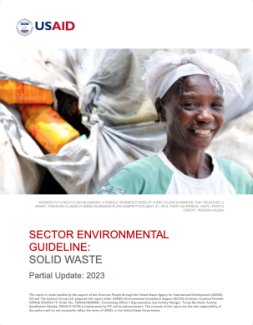Rapid growth in global population, urbanization, economic growth and a burgeoning middle class, are expected to lead to a correlative increase in waste generation focused in urban areas of the developing world. At the same time, shifting patterns of production and consumption are leading to greater complexity in managing waste. Faced with such trends, and lack of funding and capacity, many solid waste management authorities in such areas will find it increasingly challenging to provide necessary services, infrastructure and facilities, while addressing the associated threats to public health, society and the environment. In this context, USAID’s role in supporting the development of sustainable waste management projects, programs and activities offers significant potential for achieving a wide range of benefits, including minimizing public health risks and environmental impacts and enhancing sustainability.
These Sector Environmental Guidelines provides an overview of the solid waste management sector, types of waste, systems for reducing, collecting, treating and disposing wastes, and the planning and implementing of such systems. Additionally, these Guidelines introduce and outline potential environmental and social impacts, and climate change risks, associated with the solid waste management sector and discusses potential mitigation and management measures to address these impacts and risks.

